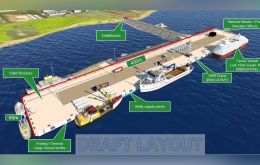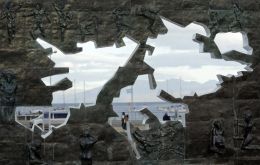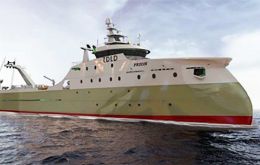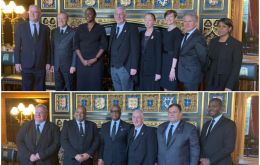MercoPress. South Atlantic News Agency
Falkland Islands
-
Saturday, October 1st 2022 - 09:47 UTC
Fourth Committee on Decolonization approves program for UN General Assembly 77th session

The Fourth Committee (Special Political and Decolonization Committee) approved its work program for the seventy-seventh session of the United Nations General Assembly, covering topics ranging from the decolonization of the 17 remaining Non-Self-Governing Territories and United Nations peacekeeping operations, to the plight of Palestinian refugees and other Arab territories, among other agenda items.
-
Friday, September 30th 2022 - 10:37 UTC
Ample commitment from Labour with Falkland Islands self determination

The round of United Kingdom political parties conferences has commenced and this week at Liverpool was Labour week, with the Falkland Islands government presence larger than normal, to mark this year the 40th anniversary of the war and Liberation.
-
Friday, September 30th 2022 - 09:41 UTC
Falklands suspends new port facility works due to an 'increase in costs': from £50-70m to some £157m

The second phase of the development of the Falklands' new port facility is not to go ahead due to an “increase in costs” according to the Falklands Government, FIG.
-
Thursday, September 29th 2022 - 10:39 UTC
Tierra del Fuego students competition on Malvinas issues

High School students from Ushuaia, capital of the Argentine southernmost province of Tierra del Fuego were invited to participate in a competition, “Asking about Malvinas”. The competition to mark the fortieth anniversary of the Falklands/Malvinas war was sponsored by the city's program “Young Ushuaia”, and the provincial Youth Coordination office from the Culture and Education ministry.
-
Thursday, September 22nd 2022 - 10:44 UTC
Cafiero discusses Argentina's accession to BRICS with Chinese colleague

Argentine Foreign Minister Santiago Cafiero Wednesday discussed his country's joining BRICS with his Chinese colleague Wang Yi on the sidelines of the 77th United Nations General Assembly in New York.
-
Wednesday, September 21st 2022 - 10:45 UTC
Cafiero claims the Falklands during a ministerial Atlantic Basin meeting chaired by US Secretary of State

Foreign minister Santiago Cafiero said that ”Argentina aspires the South Atlantic becomes a region recognized as an example of peace and dialogue among nations. For this it is essential to find a solution, through peaceful means, to the sovereignty controversy between Argentina and the UK regarding the Malvinas, South Georgia, and South Sandwich Islands, and adjoining maritime spaces, a controversy which has been ongoing for almost 190 years.
-
Wednesday, September 21st 2022 - 10:40 UTC
Argentine president again calls on the UN for Falklands' sovereignty negotiations

On Tuesday, Argentine president Alberto Fernandez addressed the United Nations General Assembly and in his long speech as usual there was a special demand for Argentina's legitimate sovereignty rights over the Falklands and other South Atlantic Islands.
-
Wednesday, September 21st 2022 - 10:39 UTC
Fortuna announces the construction of a new trawler

Over recent weeks, the Boards of Fortuna Ltd and our partners have approved the construction of a new trawler to replace the FV Capricorn in the Loligo fishery in early 2025. The vessel will be owned and operated by Fortuna Joint Venture Company - “Petrel Fishing Company Ltd”.
-
Wednesday, September 21st 2022 - 10:05 UTC
Falklands governor and Legislative Assembly representative MLA Roger Spink meet House of Commons Speaker

Over the weekend and ahead of the state funeral on Monday 19th September, the Speaker of the House of Commons, Sir Lindsay Hoyle met with representatives from British Overseas Territories, attending ceremonies in London.
-
Wednesday, September 21st 2022 - 09:58 UTC
Falklands new Director of Education: ex Principal and Chief Executive of City College Southampton

The Falkland Islands Government has announced the appointment of Sarah Stannard as the new Director of Education, who arrived in the Islands on Monday 12 September 2022. Sarah read History at Kings’ College London and, more recently gained a Masters in Education at the University of Southampton.
